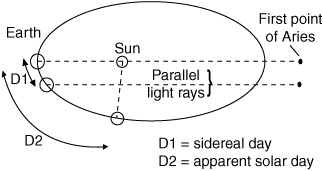Sidereal day — Day Day (d[=a]), n. [OE. day, dai, dei, AS. d[ae]g; akin to OS., D., Dan., & Sw. dag, G. tag, Icel. dagr, Goth. dags; cf. Skr. dah (for dhagh ?) to burn. [root]69. Cf. {Dawn}.] 1. The time of light, or interval between one night and the next; the … The Collaborative International Dictionary of English
sidereal day — Day Day (d[=a]), n. [OE. day, dai, dei, AS. d[ae]g; akin to OS., D., Dan., & Sw. dag, G. tag, Icel. dagr, Goth. dags; cf. Skr. dah (for dhagh ?) to burn. [root]69. Cf. {Dawn}.] 1. The time of light, or interval between one night and the next; the … The Collaborative International Dictionary of English
sidereal day — n. the time between two successive passages of the vernal equinox across the meridian: it measures one rotation of the earth and equals 23 hours, 56 minutes, 4.1 seconds of mean solar time … English World dictionary
sidereal day — a unit of time used in astronomy, equal to the period of time in which the earth makes one rotation relative to the stars. If we could view the earth from outside the Solar System, we would see that it actually completes 366.242 rotations… … Dictionary of units of measurement
sidereal day — A day measured by the transit of certain stars. A day which begins at the noon or middle of the day, in common parlance. 52 Am J1st Time § 14. A mean sidereal day is 23 hours, 56 minutes, 4.091 seconds of mean solar time. Rochester German Ins. Co … Ballentine's law dictionary
sidereal day — noun the time for one complete rotation of the earth relative to a particular star, about 4 minutes shorter than a mean solar day • Syn: ↑day • Hypernyms: ↑time unit, ↑unit of time, ↑sidereal time … Useful english dictionary
Sidereal Day — The true rotation period of a planet, determined by the time between appearances of a star in the same place in the sky. Since the rotation of the Earth is gradually slowing down, a day in the past was shorter than now, and in the future it… … The writer's dictionary of science fiction, fantasy, horror and mythology
sidereal day — side′real day′ n. astron. the interval between two successive passages of the vernal equinox over the meridian, being about four minutes shorter than a mean solar day • Etymology: 1785–95 … From formal English to slang
sidereal day — /saɪˌdɪəriəl ˈdeɪ/ (say suy.dearreeuhl day) noun See day (def. 3e) …
sidereal day — Astron. the interval between two successive passages of the vernal equinox over the meridian, being about four minutes shorter than a mean solar day. [1785 95] * * * … Universalium

